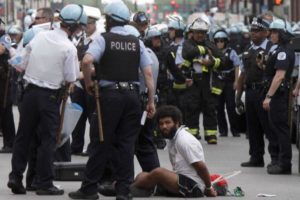A month after the ACLU issued a report concluding that the stop-and-frisk practices used by Chicago police were far more racially discriminatory than the ones at use in New York that were ruled illegal by a federal judge, six Black men have filed a lawsuit accusing Chicago police of violating their constitutional rights.
The lawsuit was the inevitable result of the ACLU’s findings about the discriminatory practices of the Chicago Police Department. The plaintiffs, named as Darnell Smith, Darren Nathan, Gregory Davis, Jeff Coleman, Phillip Overton and Marque Ross, are asking the court for relief by making the CPD discontinue its discriminatory policies, in addition to compensatory and punitive damages for themselves and attorneys’ fees. The suit names as defendants the city of Chicago, Police Superintendent Garry McCarthy and a group of unknown officers. In the suit, they ask for a trial by jury.
The report by the ACLU of Illinois found that Chicago police targeted Black Chicagoans for illegal stops far more than any other group. In addition, Chicago police stopped city residents at four times the rate officers did in New York, meaning the level of harassment of Black residents is far greater in Chicago than it ever was in New York.
From the perspective of the Black residents who are stopped, the ACLU of Illinois described the experience as “often invasive, humiliating and disturbing.”
This is the same police department that was shown in a recent report in The Guardian to operate a CIA-style secret site called Homan Square that police used to interrogate and even beat mostly Black suspects off the books. One Black man even died at the Homan Square site.
“The abuse of stop and frisk is a violation of individual rights, but it also poisons police and community relations,” the ACLU report said. “As recognized by the Department of Justice, the ‘experience of disproportionately being subjected to stops and arrests in violation of the Fourth Amendment shapes black residents’ interactions with the [the police], to the detriment of community trust,’ and ‘makes the job of delivering police services … more dangerous and less effective.’”
In other words, excessive use of stop-and-frisk doesn’t work.
The ACLU used New York as a point of comparison because the New York stop-and frisk policy was placed under the scrutiny of the legal system in a closely monitored 2013 federal trial. At the trial’s conclusion, a federal judge, Shira Scheindlin, issued a scathing decision that lashed city officials who had “turned a blind eye” to evidence that officers carried out the searches in a “racially discriminatory manner,” violating individuals’ right to privacy and equal treatment under the law.
“In their zeal to defend a policy that they believe to be effective, they have willfully ignored overwhelming proof that the policy of singling out ‘the right people’ is racially discriminatory and therefore violates the United States Constitution,” the judge wrote.
Scheindlin wrote that the unconstitutional stops have exacted a “human toll” in demeaning and humiliating law-abiding citizens.
According to the ACLU’s analysis of 250 randomly selected police stops, Black Chicago residents were subjected to 72 percent of all stops, yet constitute just 32 percent of the city’s population.
In addition, according to the ACLU, “Chicago stops a shocking number of people.”
“Last summer, there were more than 250,000 stops that did not lead to an arrest,” the report said. “Comparing stops to population, Chicagoans were stopped more than four times as often as New Yorkers at the height of New York City’s stop and frisk practice.”
The ACLU criticized the Chicago Police Department for failing to train, supervise and monitor law enforcement’s presence in Black communities “for decades.”
It was because of a series of lawsuits filed by the ACLU of Illinois that Chicago police are required to fill out “contact cards” whenever they stop someone, writing down the reasons for a stop and descriptive information on the person stopped, such as race and gender.
The ACLU found that in the cases it reviewed, in nearly half the stops the police “either gave an unlawful reason for the stop or failed to provide enough information to justify the stop.”
The ACLU was also disturbed that the Chicago Police Department refuses to keep adequate data about its officers’ stops, not requiring officers to identify stops that result in an arrest or ordinance violation. They also don’t keep any data on when they frisk someone.
“This failure to record data makes it impossible for police supervisors, or the public, to identify bad practices and make policy changes to address them,” the ACLU said.
In the report, the ACLU gave examples of stops that did not rise to the constitutionally required level of reasonable suspicion. In many of them, the cop described the suspect as “loitering.” In other words, just standing there. In the eyes of Chicago Police, Black males standing somewhere is reasonably suspicious behavior.
Taking a closer look at specific neighborhoods, the ACLU determined that there are more stop per capita in neighborhoods like Englewood, which is almost all Black. In Englewood, there were 266 stops per 1000 people, while in the predominately white district Lincoln/Foster there were 43.
“While this may be the result of a plan to address crime in those neighborhoods, we strongly question the legitimacy of this enforcement approach,” the ACLU said.
In Chicago’s predominantly white police districts—Near North, Town Hall, and Jefferson Park—the disparity between the Black population and percentage of stops is even starker than city-wide data. For example, although Jefferson Park’s African American population is just 1 percent, African Americans make up almost 15 percent of all stops.



